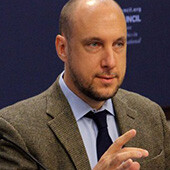This international conference included three panels: Cultural and Universal Norms; Political Will and Responsibilities; and Managing Systemic Risk and Systemic Crisis.
Our second annual Global Ethics Fellows Conference in New York City last week was a great success. Here is an overview of some of the proceedings:
Panel I: Cultural and Universal Norms
Led by Kei Hiruta, Helle Porsdam, Hakan Altinay, Deen Chatterjee, Aine Donovan, Fernanda Duarte, Madoka Futamura, Mohsen Kadivar, and Zhaohui Yu, this panel examined the themes of global norms, human rights minimalism, individual rights, and the failure of multiculturalism. The panel discussed the debate of transitional justice and whether justice in society is reconcilable with religion. Their conversation provoked stimulating thought on the global ethic as it applies to business models, universal knowledge, cultural practices, gender equality, legal culture, and political systems.
Panel II: Political Will and Responsibilities
Panel II, which included Lyn Boyd-Judson and David Ritchie, discussed the challenge of turning global ideals into practical policies in political systems. The chairs introduced the concept of the universality of constitutionalism, as well as the difficulty of incorporating all ideals, not solely “Western” or “American” thought, into our public discourse on the global ethic.
Panel III: Managing Systemic Risk and Systemic Crisis
Headed by Jean-Marc Coicaud, Katsuhiko Mori, David Rodin, and Christian Barry, this panel examined the concepts of negative and positive externalities, economic sustainability, and the causality of harm. In particular, the panel debated the moral code of ethics within biodiversity laws, sustainable development, and global economic growth.
Day 2: Additional Points of Interest
A central focus of the conversation of Day 2 involved how best to get students to care about the global ethic. One immediate answer was promoting the global ethic on a digital platform. Technology, with the advent of the Internet, allows students from all over the world to collaborate on the idea of the global ethic in one space. The fellows emphasized the need for their work to be accessible to students worldwide via the Global Ethics Network. This way, fellows and students can exchange differing perspectives on global ethical issues.



